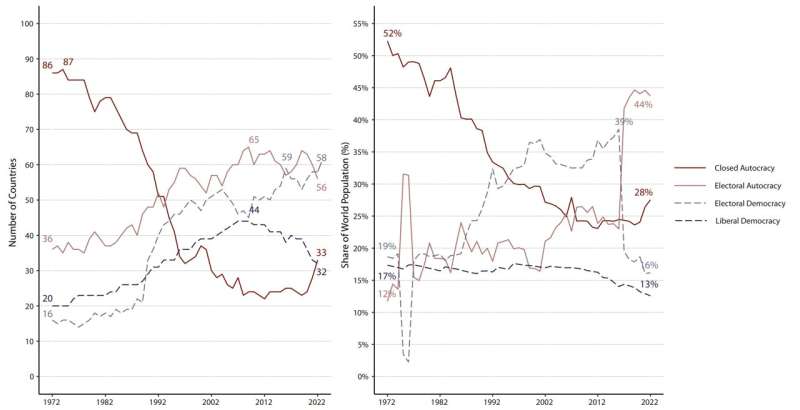This article has been reviewed according to Science X's editorial process and policies. Editors have highlighted the following attributes while ensuring the content's credibility:
fact-checked
trusted source
proofread
Report: The world is becoming increasingly authoritarian, but there is hope

For the first time in two decades, there are more closed autocracies than liberal democracies in the world, but the future is not entirely bleak. This is shown in this year's democracy report from the Varieties of Democracy Institute (V-Dem Institute) at the University of Gothenburg.
A democratic decline has taken place globally, and an increasing number of people are living in closed autocracies. The report that is now being released shows that this trend is continuing, and that the world has not been more anti-democratic in 35 years.
"The level of democracy enjoyed by the average world citizen in 2022 is back to 1986 levels. This means that 72 percent of the world's population, 5.7 billion people, live under authoritarian rule," according to Staffan I. Lindberg, Director of the V-Dem Institute.
The democratic decline has been most dramatic in the Pacific region, Eastern Europe, Central Asia, Latin America, and the Caribbean. But the number of countries in the world that are currently experiencing democratic setbacks, or autocratization, has greatly increased over the past ten years—from 13 to 42 countries between 2002–2022, which is the highest figure measured by V-Dem to date.
More closed autocracies than liberal democracies
Generally, countries experience autocratization when authoritarian political movements gain direct influence over governmental policy, where they can dismantle democratic institutions: free media, civil society, independent organizations, and the judicial system. Once this has begun, in the vast majority of cases, it eventually leads to the dismantling of democracy.
The global advance of closed autocracies is also highlighted in this year's report. For the first time in two decades, the world has more closed autocracies than liberal democracies.
"28 percent of the world's population, 2.2 billion people, now live in closed autocracies compared to 13 percent, 1 billion people, who live in liberal democracies."
There is hope
However, some countries have managed to return after long periods of democratic dismantling. Bolivia, Moldova, Ecuador, the Maldives, North Macedonia, Slovenia, South Korea, and Zambia have all succeeded in reversing their autocratic evolution.
"The fact that eight democracies that were in a period of autocratization have stopped that process and 'bounced back' is uplifting news for democracy. It is rare to see countries that can make a U-turn. The countries that have succeeded in doing have brought about a pro-democracy mobilization, they have re-established an objective judicial system, deposed authoritarian leaders, introduced free and fair elections, worked to reduce corruption, and rejuvenated civil society," says Staffan I. Lindberg.
More information: Report
Provided by University of Gothenburg





















